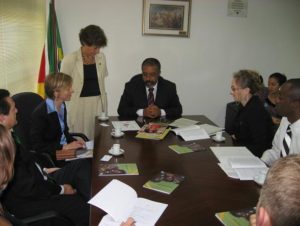
Afro-Brazilian Property Rights
As part of a multi-year project on Afro-descendant and indigenous land rights in Latin America, the Rapoport Center coordinated a week-long fact-finding delegation to Brazil to investigate and gather information on the status of collective lands claims by Afro-Brazilian communities.
The delegation was comprised of a multidisciplinary group of students enrolled in a semester-long class on Human Rights Research and Writing taught by Professor Karen Engle, director of the Rapoport Center. Ten students from the School of Law, Lozano Long Institute of Latin American Studies, and LBJ School of Public Affairs joined Engle and Professor Ariel Dulitzky, the Center’s associate director, to conduct interviews and participate in discussions with Afro-descendant community representatives, government officials, NGOs, activists, and academic institutions over the successes, opportunities, challenges, obstacles and delays of quilombo land titling in Brazil. The trip was ambitious in scope, leading Andrew Biberstein, a third-year law student who previously studied in Brazil, to note that he learned “how challenging the logistical side of a human rights delegation can be, particularly in terms of travel, scheduling, language, and foreign legal systems.”
“It is a miracle that legislation is in place to directly shift land title from the historically privileged to the historically neglected and it is no surprise to me that it is now meeting such resistance.” — Gina LaMotte (LLILAS)
The 1988 Brazilian Constitution formally recognized the rights to culture and collective property title for certain Afro-descendant communities. These Afro-descendant communities, largely comprised of the descendants of freed or escaped slaves, have traditionally occupied lands referred to as quilombos. According to Dulitzky, quilombos face an increasing threat of encroachment and, without formal title, the communities that live on the lands have little or no protection against displacement. “Despite the constitutional promises made over twenty years ago,” he noted, “only a handful of the more than 3,000 self-identified quilombo communities have received their land titles.”
“Most quilombos lack the political and economic power of their adversaries and face seemingly insurmountable obstacles to obtaining title at this time,” added Mary Isernhagen, third-year law student who was part of the delegation. Matt Wooten, LLILAS Master’s degree candidate and trip co-facilitator, concluded that “the situation facing quilombo communities in Brazil is hardly encouraging. While the government continues to prolong and complicate the titling process, thousands of communities—long invisible within their own country—await the realization of the constitutional guarantee to their lands, as well as the basic recognition of their people as Brazilian citizens.”
The delegation began its research with a visit to Sacopa, an urban quilombo located in one of the wealthiest neighborhoods of Rio de Janeiro that has struggled for thirty years to achieve official title over its land. While in Rio de Janeiro, the UT group also met with academics and students at Pontifícia Universidade Católica do Rio de Janeiro to discuss Brazilian history, racial discrimination, and debates over collective land rights. They also met with a number of NGOs and quilombo organizations to discuss domestic and international legal mechanisms available to support.
The delegation then divided into two. One group traveled to Brasilia and Salvador, while the other visited the regions surrounding Rio de Janeiro and São Paulo. The groups visited representatives of several quilombo communities including Marambaia in the State of Rio de Janeiro, San Francisco do Paraguaçu, in the State of Bahia, and Andre Lopes and Ivaporunduva in the State of São Paulo. They also visited Gamboa de Baixo, a traditional fishing community in the city of Salvador. The delegation received firsthand information about the experiences of these communities in their efforts to achieve full recognition as citizens of Brazil. For Tina Codini, a second-year law student, “meeting with the quilombolas, hearing them voice title as their main priority, as the means to social betterment and the key to making them visible in Brazilian society, helped affirm the import of this issue. I have gained insight into the real racial tensions that exist in a country that lauded its ‘racial democracy.’”
The delegation also met with high-level authorities of many of the administrative agencies involved with quilombo titling, including representatives of Secretaria Especial de Políticas de Promoção da Igualdade Racial (SEPPIR), Instituto Nacional de Colonização e Reforma Agrária (INCRA), Fundação Cultural Palmares, and Instituto de Terras do Estado de São Paulo (ITESP). The Advocacia-Geral Da União (AGU), the office of the Procuradoria, Federal Public Prosecutor Daniel Sarmento, Senator Paolo Paim and Supreme Court Justice and UT Law faculty member Antonio Benjamin also received the delegation.

“This experience has shown me the importance of advocating for groups without a voice, and the process of researching and fact-finding has been very influential in helping me to channel my future energies and goals toward the protection of human rights,” said Raegen Rogers, a second year law student.
“Having worked with communities of color in the United States, I saw many parallels (and differences) while in Brazil. I saw firsthand that the context of a social struggle is arguably the same everywhere – race and class disparities, lack of political will to change the circumstances under which these disparities are carried out, and that the strongest effort usually comes from the grassroots level of these communities organizing” added Karla Vargas, a third-year law student in the joint degree program with the LBJ School of Public Affairs. LLILAS graduate student Gina LaMotte noted, “It is a miracle that legislation is in place to directly shift land title from the historically privileged to the historically neglected and it is no surprise to me that it is now meeting such resistance.”
“This project on Afro-descendant land rights is central to the Rapoport Center’s mission,” said Engle, who organized a similar delegation to Colombia last spring. “It brings together students with diverse backgrounds around the study of a significant but largely invisible problem that is legal, political, economic and cultural.” LLILAS Master’s degree candidate Jonathan Square added that as a result of this project he “learned how to bridge the gap between academic research and actual legwork in the field. It is one thing to study quilombos on paper, but it is another to actually meet and befriend members of these communities.” Christie Turner, a third-year law student and Rapoport Center Human Rights Scholar who co-facilitated the trip echoed a similar feeling after meeting the members of the quilombo communities, “It was an amazing experience to meet people from the communities. I could tell that it meant a great deal to them that a group of students from the United States came all the way to Brazil to support their community. After all of the resistance and discrimination they have faced from wealthy landowners, it was important for them to know that their struggle is being heard.”
The trip was co-sponsored by the Strauss Center for International Security and Law, the Teresa Lozano Long Institute of Latin American Studies, the Bridging Disciplines Program, and the Brazil Center.
Recent News
Rapoport Center Faculty Publish Op Ed Opposing Space Station on Afro-descendant Lands in Brazil (October 2, 2019)

